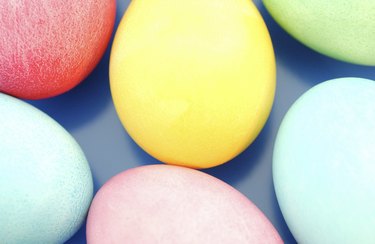Things You'll Need
Vegetable oil
Food coloring
Vinegar
Water
3 plastic bowls
Spoon
Paper towels

The practice of dyeing eggs for Easter has been around for thousands of years. Dyeing eggs began as a representation of the life force and as a celebration of friendship that occurred during the spring equinox. Today, children across America look forward to dyeing Easter eggs with their parents as a way to celebrate their faith or in preparation for the Easter bunny. You can produce your own egg dye at home with your children this year.
Step 1
Boil several eggs and allow them to cool before handling.
Video of the Day
Step 2
Place 1 tbsp. of each of the following ingredients into a small plastic bowl: vegetable oil, vinegar and food coloring of your choice. The vegetable oil will give the eggs a marbleized appearance because it will not allow some of the color to adhere to the egg.
Step 3
Add water to the mixture until it is deep enough to cover an entire egg.
Step 4
Repeat this process until you have three different colors prepared.
Step 5
Mix the ingredients with a spoon and quickly place an egg into it. Leave the egg to sit in the coloring for a few seconds. Mixing the color directly before you place the egg into the water will help achieve the marble look.
Step 6
Gently rub the egg until it is dry with a piece of paper towel, and dip the egg into the second color, following Step 5.
Step 7
Rub the egg dry again, and dip the egg into the third color.
Step 8
Gently rub the egg dry, but leave some of the oil behind to give the egg a more glazed appearance.
Tip
To avoid dripping colored water on any surface, dye the eggs on top of a disposable surface such as a piece of cardboard or a newspaper.
Produce homemade dyes by using natural ingredients that are boiled with the vinegar before any oil is added. For instance, the color red can be achieved by using beets, and the color brown will result from using coffee grounds.
Video of the Day